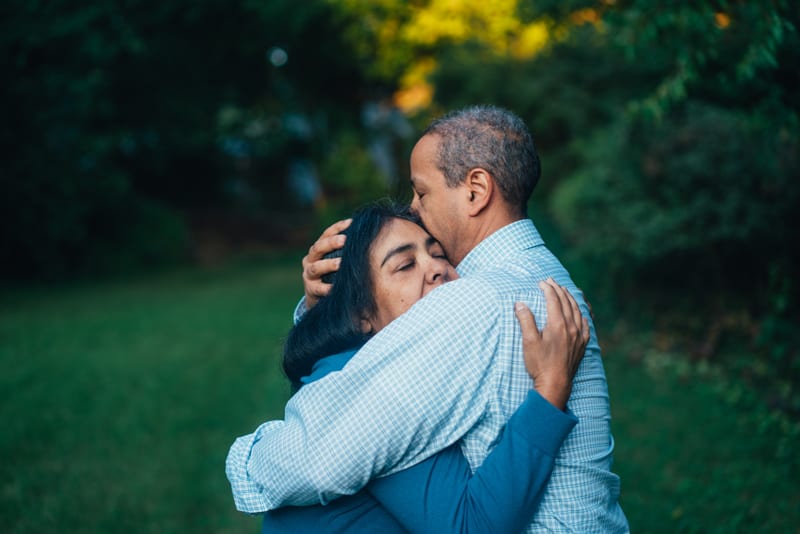The loss of a loved one is immeasurable. Grieving that loss is a natural process, but it is not an easy one, and it can affect people in significantly different ways.
Coming to terms with a loss often involves a fair amount of introspection. There may be similar steps that people transition through along the way, but the grieving process is different for everyone.
No two deaths look alike, and caring for someone who is grieving can be confusing when there is no fixed set of instructions. An essential facet of supporting someone through grief is to understand that there is no “normal.” The best care will come from listening, accepting, and adapting to the experiences of a loved one who is suffering.
Being There When You’re Needed (And Knowing When You’re Not)
The surest way to identify the needs of a grieving loved one is to listen when they are ready to talk. Active listening requires empathy and practice. It involves undivided attention, body language, and selective feedback.
Some people may not want advice or affirmation and would rather have someone they can vent to who will empathize with them. The grieving person should lead the conversation.
A talk with someone grieving should never include judgment. While the intent may be sympathetic, even favorable feedback on their actions can make people feel they are being criticized or evaluated.
Instead, acknowledging loved ones’ grief process reinforces that their responses are natural. For example, one might say, “This must be difficult for you and your family,” or “What you’re going through must be painful, is there any way I can help?”
Avoid expressions that explain or justify the loss. Saying, “He lived a long life,” “She’s with God now,” or “He’s not suffering anymore,” suggests that the grief is invalid.
Cultural and personal differences impact how much social interaction someone may want to have after a loss. In some cases, individuals will need more space and time away from others to mourn.
Treatment for terminal illnesses, such as cancer, is typically a lengthy process and often involves many family members and loved ones. It’s natural if a person needs to spend time alone to mourn, and that decision should be respected. However, it’s essential that the person grieving knows you are available for support and ready to listen if needed.
Other Ways to Offer Support
In addition to being available for someone who is grieving, offering to help with daily tasks can make a significant difference. Grocery shopping, cooking, scheduling appointments, and house cleaning are all things that can interrupt the grieving process.
Providing direct assistance for needed tasks will often be appreciated. However, listening remains vital to avoid seeming invasive when space is required, or if the bereaved would rather exercise independence.
The Effect of Disease on the Stages of Grief
A drawn-out sickness, such as cancer, Alzheimer’s disease, or COVID-19, can often lead to a response the American Cancer Society calls anticipatory grief, which is the act of grieving before death has occurred. In some ways, anticipatory grief can be beneficial in helping loved ones prepare for the loss and take the time to carry out final wishes.
However, even an expected loss can bring about shock and great sadness. For most people coping with a death, anticipatory grief does not diminish movement through the stages of grief.
Each person experiences these stages at different speeds and sometimes in an alternate order. Some people may regress to earlier steps and find it difficult to move through to acceptance.
Researchers detail the five steps that grieving adults most commonly experience as:
- Denial: Often the lengthiest stage, denial can occur before the loss, especially if the patient is undergoing active treatment. After the initial shock of numbness or fear, the grieving individuals may isolate themselves and avoid discussing the loss.
- Anger: This second stage can sometimes be the most draining. Feelings of frustration and agitation often mix with crying, listlessness, or anxiety. This step may not always be evident, as the grieving person may internalize these emotions and seem distracted.
- Bargaining: The bargaining step describes grieving individuals who are working to define their feelings of loss and discover a meaning for their grief. In this stage, they may begin reaching out to support groups or loved ones to discuss more intimate emotions and develop ideas for working through the pain.
- Depression: The bargaining process does not bring immediate resolution. Depression sets in as grieving individuals realize the long-term effects of loss and how their life will likely change. This step can be overwhelming, and the grieving person may feel lost or helpless. Without strong support, regression into earlier stages is possible.
- Acceptance: Accepting the loss of a loved one may often take a year or more. Adjusting to daily life and a new “normal” is a long process involving remarkable strength.
Benefits of Joining a Support Group
Helping someone through the stages of grief is honorable, but it can be difficult without knowing the best resources available for support.
Taking care of someone who has experienced a loss due to illness isn’t something that a loved one should undertake alone. Offering to join a support group with someone who is grieving is one of the best ways to support him or her.
Support groups offer their members a way to deal with grief by better understanding the grieving process. Cancer loss support groups recognize the unique challenges associated with cancer death and how they impact the stages of grief. These groups offer educational and emotional support resources for those who are grieving, as well as their caretakers.
One-on-one counseling is an excellent service that provides extended time with an expert who helps people develop coping mechanisms. Additionally, many support groups provide assistance by connecting someone who is grieving with a group member who can talk him or her through a particularly painful wave of grief.
A unique aspect of grief support groups is their ability to forge new relationships and friendships with others who understand the grieving process.
Mourning takes many shapes and forms. The support a loved one can offer must be adaptable, and it must be long-term. Grief and pain may unexpectantly resurface years later, and assistance from a reliable support system will always be a priceless advantage.
If you or someone you know experiences mental health issues, it is important to seek help from a qualified professional. Our Resource Specialist can help you find expert mental health resources to recover in your community. Contact us now for more information on this free service to our users.
About the Author

——-
Sean Marchese is a registered nurse at The Mesothelioma Center with experience as a research nurse developing and managing oncology clinical trials and therapies. Now, he helps raise awareness of breakthrough research, treatments, and strategies for patients with mesothelioma through investigative medical writing at Asbestos.com.
Photo by Gus Moretta on Unsplash
The opinions and views expressed in any guest blog post do not necessarily reflect those of www.rtor.org or its sponsor, Laurel House, Inc. The author and www.rtor.org have no affiliations with any products or services mentioned in the article or linked to therein. Guest Authors may have affiliations to products mentioned or linked to in their author bios only.
Recommended for You
- The Intersection of LGBTQ+ Identity and Mental Health - December 9, 2024
- What Are the Signs of Self-Harm? A Comprehensive Guide - December 5, 2024
- People-Pleasing: Definition, Examples, and What You Can Do Instead - December 2, 2024







Thanks for these tips on how to help someone who is grieving. I appreciate that you mentioned that it’s important to listen when they want to talk and to let them lead the conversation. I think it would also be smart to read more about grief to see if you could give any advice or help them in any other ways they may need that you might not think of.